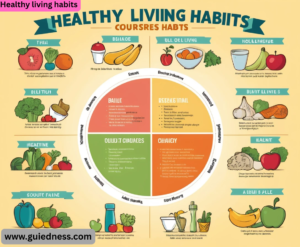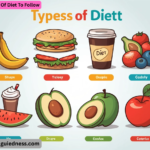Healthy living habits Of course! Cultivating healthy living habits is a journey, not a destination. It’s about making consistent. small choices that add up to a significant positive impact on your physical, mental, and emotional well-being. Here is a comprehensive guide to building and maintaining healthy habits, broken down into key areas.
Nutrition: Fueling Your Body
- Think of food as the foundation of your health. What you eat directly affects your energy, mood, and long-term health.
- Prioritize Whole Foods: Base your diet on foods that are as close to their natural state as possible.
Fill half your plate with these.
- Whole Grains: Choose brown rice, quinoa, oats, and whole-wheat bread over refined grains (white bread, white pasta).
- Lean Proteins: Include sources like chicken, fish, beans, lentils, tofu, and nuts.
- Healthy Fats: Incorporate avocados, olive oil, nuts, and seeds. They are crucial for brain and heart health.
- Aim for ~8 glasses (2 liters) a day, more if you are active or in a hot climate.
Carry a reusable water bottle as a reminder.
Limit sugary drinks like soda and juice.
Practice Mindful Eating:
- Eat Slowly: It takes about 20 minutes for your brain to register that you’re full.
- Avoid Distractions: Don’t eat while watching TV or scrolling on your phone. Pay attention to your food.
- Listen to Your Body: Eat when you’re hungry and stop when you’re satisfied, not stuffed.
- Moderation, Not Deprivation: It’s okay to enjoy your favorite treats occasionally. A restrictive diet is often unsustainable. The 80/20 rule (eating well 80% of the time) is a great guideline.
Physical Activity: Move Your Body Regularly
- Exercise is crucial for maintaining a healthy weight, strengthening your heart and bones, and boosting your mood.
- Find Something You Enjoy: You’re more likely to stick with it if it’s fun. This could be dancing, hiking, swimming, cycling, or team sports.
Mix It Up (The F.I.T.T. Principle):
- Cardio (Aerobic): Aim for at least 150 minutes of moderate-intensity (brisk walking, cycling) or 75 minutes of vigorous-intensity (running, swimming laps) exercise per week.
- Strength Training: Include resistance exercises (weight lifting, bodyweight exercises, resistance bands) at least 2 days a week.
- Flexibility and Balance: Incorporate stretching, yoga, or Pilates to improve range of motion and prevent injuries.
Incorporate Movement into Your Day:
- Take the stairs. Park farther away. Have walking meetings.
- Do a 5-minute stretch break every hour.
Sleep: The Cornerstone of Health
- Quality sleep is non-negotiable for physical repair, memory consolidation, and emotional regulation.
- Prioritize Consistency: Go to bed and wake up at the same time every day, even on weekends.
- Aim for 7-9 Hours: Most adults need this range for optimal function.
Create a Restful Environment:
Keep your bedroom cool, dark, and quiet.
- Use your bed only for sleep and intimacy.
- Develop a Wind-Down Routine:
- Avoid screens (phone, TV, laptop) for at least 30-60 minutes before bed. The blue light disrupts melatonin production.
- Read a book, listen to calm music, take a warm bath, or practice gentle meditation.
Mental & Emotional Well-being: Nurture Your Mind
Manage Stress: Chronic stress is harmful.
- Practice techniques like deep breathing, meditation, or mindfulness.
Spend time in nature.
Engage in hobbies you enjoy.
- Healthy living habits Cultivate Social Connections: Strong relationships are vital for longevity and happiness.
- Nurture relationships with family and friends.
- Seek out community groups or clubs with shared interests.
- Practice Gratitude: Take a moment each day to reflect on things you are thankful for. This can shift your perspective and improve overall happiness.
- Seek Help When Needed: There is no shame in talking to a therapist or counselor to navigate life’s challenges.
. Prevention & Routine Care
Being proactive is key to long-term health.
- Schedule Regular Check-ups: Don’t skip your annual physicals, dental cleanings, and recommended health screenings (e.g., blood pressure, cholesterol, cancer screenings).
- Practice Good Hygiene: Regular handwashing is one of the easiest ways to prevent the spread of illness.
- Wear Sunscreen: Protect your skin from harmful UV rays every day, even when it’s cloudy.
How to Build These Habits Successfully
- Start Small: Don’t try to change everything at once. Pick ONE small habit to focus on (e.g., “I will drink a glass of water with every meal” or “I will take a 10-minute walk after lunch”).
- Be Specific and Realistic: “Exercise more” is vague. “Walk for 20 minutes on Monday, Wednesday, and Friday” is specific and achievable.
- Pair Habits (Habit Stacking): Link a new habit to an existing one.
- Track Your Progress: Use a journal, app, or calendar to mark your successes. This provides a visual record of your commitment.
- Be Kind to Yourself: You will have off days. It’s normal. Practice self-compassion and get back on track with your next choice, without guilt.
The Power of Micro-Habits: Making Change Invisible
- The key to lasting change is to make it so small it’s almost impossible to fail. This builds momentum and reinforces your identity as a healthy person.
- The “One-Bite” Rule: Don’t overwhelm yourself with “eat more veggies.” Commit to eating one bite of a vegetable with dinner. That’s it. You’ll often eat more, but the habit is successfully completed with just one bite.
- The “Two-Minute” Rule: Can’t face the gym? Commit to putting on your workout shoes and stepping out the door. Can’t meditate for 10 minutes? Set a timer for 60 seconds. The barrier to entry is so low you’ll usually do more, but the win is in starting.
- Habit Stacking, Expanded: Attach your new micro-habit to a specific daily cue.
- “After I pour my morning coffee, I will take one vitamin.”
- “After I sit down at my desk for work, I will fill my water bottle.”
The Mindset of “Crowding Out” vs. “Cutting Out”
- Instead of focusing on restriction (“I can’t have sugar”), focus on addition (“How can I add more nutrients to this meal?”). This shifts the psychology from deprivation to abundance.
- Example: Instead of “I can’t eat pasta,” think “I will add a huge handful of spinach and lean chicken to my pasta to make it more nourishing and filling.” You naturally eat less of the pasta because you’re full of better stuff.
- The Healthy Swap Game: Make it a challenge to find healthier, equally satisfying alternatives.
- Craving something crunchy? Swap chips for air-popped popcorn or sliced apple with peanut butter.
- Craving something sweet? Swap ice cream for Greek yogurt with berries and a drizzle of honey.
- Bored of water? Add cucumber slices, mint, lemon, or frozen berries.
Deep Dive: The Pillars of Restorative Sleep
- Healthy living habits Sleep is so critical it deserves a deeper look. Poor sleep undermines every other healthy effort (increases cravings for junk food, lowers motivation to exercise, impairs judgment).
- Chronotype Awareness: Are you a natural early bird (lion), a night owl (wolf), or something in between (dolphin/bear)? While you can’t completely change your chronotype, respecting your natural energy peaks and troughs can help you schedule demanding tasks and wind-down times more effectively.
- Digital Sunset: Commit to a hard stop on screens 60 minutes before bed. The blue light suppresses melatonin. If you must use a device, enable night mode/blue light filters hours in advance.
- The 20-Minute Rule: If you can’t fall asleep after 20 minutes, get out of bed. Go to another room and do something calming (read a physical book, listen to soft music) until you feel sleepy. This prevents your brain from associating your bed with frustration and alertness.
Beyond the Scale: Non-Physical Benefits to Motivate You
- Focusing solely on weight loss is a fragile motivator. Tapping into these other benefits can keep you going when progress feels slow.
- Immediate Energy Boost: Notice how a walk outside instantly clears brain fog and boosts your mood, or how a healthy meal prevents the 3 PM energy crash.
- Improved Mental Clarity: Observe your enhanced focus, memory, and productivity after a good night’s sleep and proper hydration.
- Emotional Resilience: Pay attention to how regular exercise and meditation help you manage daily stressors without becoming overwhelmed or reactive.
- Physical Functionality: Celebrate being able to play with your kids or dog without getting winded, carrying groceries with ease, or simply feeling strong in your body.
The Social Fabric of Health
- Healthy living habits Your environment and relationships are powerful determinants of your habits.
- Social Accountability: Partner with a friend for workout sessions, healthy meal prep, or a step-count challenge. Shared goals create powerful accountability and make the process more fun.
- Environment Design: Make healthy choices the easy choices and unhealthy ones harder.
- Healthy: Keep a fruit bowl on the counter. Pre-cut veggies and store them at eye-level in the fridge. Have your workout clothes ready the night before.
- Unhealthy: Don’t keep junk food in the house. If it’s there, put it in an inconvenient, hard-to-reach cupboard. Delete food delivery apps from your phone’s home screen.
Listening to Your Body: The Ultimate Skill
- True health is about internal awareness, not just following external rules.
- Honor Your Cravings (Intelligently): A craving can be a signal. Craving chocolate might mean you need magnesium (try nuts, seeds, or dark chocolate). Craving red meat might mean you need iron or protein.
- Rest When You Need It: A “rest day” from exercise is not a failure; it’s a required part of the process for muscle repair and growth. Pushing through extreme fatigue can lead to injury and burnout.






